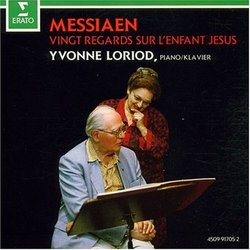| All Artists: Messiaen, Loriod Title: Vingt Regards Su L'Enfant Jesus Members Wishing: 0 Total Copies: 0 Label: Elektra / Wea Release Date: 8/3/1993 Genre: Classical Styles: Historical Periods, Modern, 20th, & 21st Century Number of Discs: 2 SwapaCD Credits: 2 UPC: 745099170523 |
Search - Messiaen, Loriod :: Vingt Regards Su L'Enfant Jesus
 | Messiaen, Loriod Vingt Regards Su L'Enfant Jesus Genre: Classical
|
Larger Image |
CD Details |
CD ReviewsVintage and definitive, quite effective Czinczar | Southeast Michigan, USA | 01/21/2000 (4 out of 5 stars) "An impressive recording by Yvonne Loriod, the composer's wife. This woman could play with great power, which serves the music well in the appropriate places. Though some might find that she didn't bring enough quietness and introspection to the places where those qualities are needed. But her interpretation could be considered to be beyond questioning, since her husband Messiaen was there at her side during the recording session. It must have been exactly what the composer intended. This recording was actually made in 1973. Analog recording was wonderful back then, with great clarity and depth, and a feel for the acoustics of the recording space. To some degree, this works to this recording's disadvantage. It was recorded at the Eglise Notre-Dame du Liban in Paris. The traffic outside the church is quite noticable, especially in the quiet passages, which somewhat breaks the mood. But the recording's plusses far outweigh its minuses. A definitive and recommended recording." Extroverted interpretation here, testament to modernity scarecrow | Chicago, Illinois United States | 08/07/2001 (5 out of 5 stars) "The recent Aimard CD of this work as well as the earlier Hakon Austbo on Naxos is another,all are different,it's incredible the amount, the traces one may find in this one-dimensional conceptually that is colossol work for the piano,for Messiaen had veritably alone created a new language of timbral pianism,he did the same for organ registrations, never quite heard before timbres. I've been in love with Loriod ever since I've owned the old Vega Vinyl of her Boulez Second Piano Sonata. Incredibly extroverted playing, yet she knows how to deeply probe the creativity,what's the sensibility, the spirit, the mysteries of creativity. She understood the young Boulez deeply, You'd think with Messiaen even more, yet as other reviewers here say,I agree she tilts the sclaes, she pummeles the work forward all the way, even the relatively passive # 4 Regard de la Vierge, marked "tendre et naif" in the music Loriod pushes forward. The # 6 "Par lui tout a ete fait, the most violent here on Disc 1 she gets sloppy, and unwantonly ugly, with the repeated almost animal like tones. She has great sense of projection of Messian's fistfulls of tones,cluster like. Loriod I think if there is one word to sum up her interpretive sensibility it is gesture, like the tender opening "Regard du Pere" Those repeated tinkly like tones if not paced and played a little off the rhythm can sound like an alarm bell,as Aimard. One nice aspect is she doesn't make this piece into one for the pipe organ as Austbo does with his thunderous octaves as in #3 L'echange". Loriod is always beyond this piece,whereas Aimard I enjoyed for he allows the piece to work its own charm, probe its own mysteries, Aimard steps back,not nearly as extroverted. But all know this piece is a testament to modernity,never afraid of being klangorous for its own sake,that a spirituality exists within the pure power of timbre, one of god's creations. There are great cascades of timbres here scouring the entire regions, and registers of the keyboard. Messiaen's musical language wasn't yet enamored over bird calls which began appearing everyplace blandly and as an obsession,This work is from right after or during the Second World War 1944, also his typical chordal excursions, was also a frequent occurrence in his latter music. Here we should thank the stars, "etoiles" that his musical language seemed to simply relish in the pure timbre of the piano, clusters, as fast as possible high register filigrees,roaring octaves,and impenetrable rhythmic convolutions.Other times the middle register is simply ommitted, when this happenes the piano percussive constitution comes to full blossum.Structurally the work breaks no new ground, it is buily on cyclical themes."
|

 Track Listings (11) - Disc #1
Track Listings (11) - Disc #1